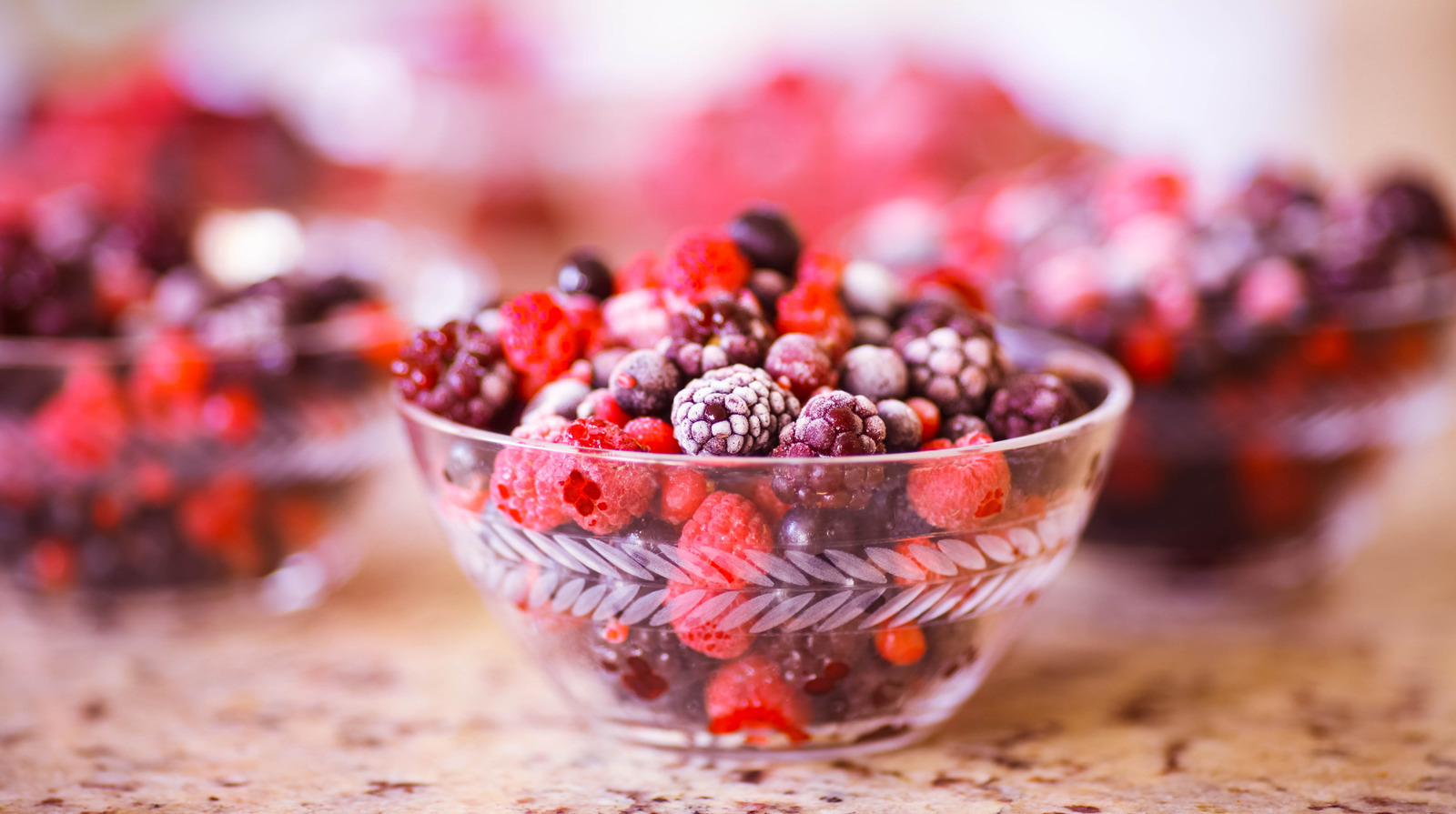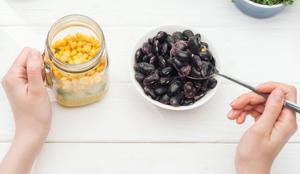Fresh fruit is out, and frozen is in. Okay, maybe that's not quite true — fresh fruit's going nowhere, and nor should it, thanks to its health benefits and sheer deliciousness — but if you haven't got on the frozen fruit train yet, you better buy a ticket. Keeping frozen fruit stashed in your freezer is a wise move for a number of reasons.
Not only does it keep for months, allowing you to enjoy it way beyond its fresh counterpart's natural shelf life, but most frozen fruits can be used in many of the same ways that the fresh versions are. Plus, frozen fruit is just as nutritious as fresh fruit, and allows you to access its health benefits when the produce is out of reason. If that wasn't enough, there's one more reason to grab that bag of frozen fruit next time you're in the store: It may actually be better overall than opting for its fresh kind.

There are plenty of types of frozen fruit that are easier to use, more reliably ripe and fresh, and even more consistently nutritious than the fresh alternative. Additionally, certain types of frozen fruit may be cheaper than opting for fresh fruit, giving you a saving while you reap the rewards. Ready to free up space in your refrigerator and join the frozen fruit revolution? We've got all the types you need to buy.
1. Cherries Frozen cherries are a little bit of a game-changer, y'all. We don't know about you, but trying to find perfectly ripe fresh cherries during their relatively short season is like finding a needle in a haystack.
Fresh cherries can also be slightly on the pricey side, and if all that wasn't enough, they can be a nightmare to prepare for your dishes: You can spend hours pitting cherries for pies, and find at the end that you've removed half of the flesh along with the stone. That's why we're huge advocates of frozen cherries. Bags of pre-pitted frozen cherries are usually super reasonably priced, and as they're available throughout the year, you don't have to hold out for hotter months to enjoy them.
You can also use them just like you would fresh cherries, giving you access to a summery cherry pie in the middle of winter. Cherries, like all fruits, are frozen at peak ripeness, locking in their freshness and flavor. Doing this also locks in their nutrients, giving you a premium source of vitamin C, potassium, magnesium, and fiber, as well as access to the anti-inflammatory properties that are so valuable in both sweet and tart cherries.
2. Mango We're not sure when the last time you tried to slice up a mango was, but we're willing to bet that it probably wasn't the most fun experience. Mangos are somewhat notoriously difficult to prepare, thanks to their combination of a massive interior seed and a certain elusiveness around when exactly they're ripe.
Buy your mango too early, and you'll end up having to hack away at its fibrous, tough texture, wasting most of the fruit in the process; buy it too late, and your mango will be way too soft and lacking in any bite. That's why it's just way easier to buy frozen mango. Like fresh mango, frozen mango is high in vitamins A, C, and E, as well as copper and folate.
However, unlike the fresh kind, there's no tricky preparation involved, and all you usually have to do is tip it into your smoothies or bakes as it is, and you're good to go. Texture-wise, too, frozen mango generally has a certain robustness when it's thawed: It doesn't get as mushy as some other frozen fruits do when left at room temperature, meaning that you can enjoy it in some of the many ways that you would eat the fresh version. 3.
Blueberries Of all the fruits you should buy frozen instead of fresh, blueberries are top of the list. Think about it: How many times have you bought a carton of blueberries, only to find that half of them are unripe and hard, and the other half are already past their prime? Plus, have you ever noticed how tart fresh blueberries can be, with the supposedly sweet fruit actually delivering a burst of acid to your taste buds? Frozen blueberries don't have either of these problems. As they're picked and frozen at peak ripeness, every single blueberry in your frozen bag is (or at least should be) perfect for eating.
This means that they have just the right level of sweetness, too, and don't have any of those bitter, acidic notes. Additionally, frozen blueberries are known for retaining their nutrient and antioxidant levels for months after they've been plunged to sub-zero temperatures. A study published in the Journal of Biomedicine and Technology found that frozen blueberries had the same levels of anthocyanin antioxidants after three months of being in the freezer, thereby remaining as healthy as if they were eaten fresh.
They'll also likely be way more cost-effective than purchasing fresh blueberries, with the frozen kind usually several bucks less than the produce section version. 4. Pineapple Unless you eat a lot of pineapple, it's almost always better to buy it frozen.
Frozen pineapple is just so much more convenient and affordable than its fresh counterpart. While hacking up a fresh pineapple can be satisfying, it takes a lot of time and work, and you'll likely be left with a large amount of leftovers that are gradually going to turn bad in your fridge. Plus, if you're not a pineapple connoisseur, it's all too easy to buy this fruit when it's still underripe, leaving you with rock-hard, fibrous pieces and a difficult slicing job on your hands.
Frozen pineapple, conversely, is always ripe and ready to go, giving you all of that tart sweetness without any of the work. Pineapple freezes excellently and retains its texture well, remaining juicy without losing too much of its bite. As it can stay fresh in your freezer for a good couple of months, there's no rush to use it all — you can pour a little into your smoothie or frozen pineapple margarita, and freeze the rest for later.
Plus, frozen pineapple has all of the health benefits that fresh pineapple does, including vitamin C and manganese. "It also contains bromelain, an enzyme that may aid digestion and reduce inflammation," says registered dietitian Kristen Lorenz over at Real Simple . 5.
Açaí If you tend to only shop in more mainstream supermarkets, you may have never seen fresh açaí berries on display. Well, there's a good reason for that. Açaí berries are bursting with omega-3 fats, which is partly what makes them so nutritious and earns them a place in countless smoothie bowls around the world.
However, these fats also mean that they can go rancid way more quickly than you'd think, meaning that in their fresh state, they have a relatively short shelf life. They tend to therefore be eaten on the same day that they're picked, which is obviously somewhat out of the question if you're buying them in an environment where they don't grow naturally. If you do try to seek them out fresh, they can often be prohibitively expensive and only available in specialist stores.
As a result, açaí berries are usually sold frozen, and that's how you want them to stay until you're ready to eat them. Freezing the berries when they're just ripe locks in both their healthy fats and their flavor, and also preserves the rest of their nutrients. Once you're ready to eat them, just leave them at room temperature until they thaw.
6. Strawberries Have you ever noticed how difficult it is to find a good strawberry? While you can sometimes get lucky with the perfect tub of strawberries at the height of summer, more often than not you end up with a pack that's squishy, bruised, and already going bad by the time you get it home. If you don't suffer this fate, you can just as easily be left with an unripe carton of strawberries that are chalky and sour.
Well, you don't have to worry about any of that if you're buying frozen strawberries. Not only are they more reliable and cost-effective than the fresh variety, but their extended lifespan means that you don't have to worry about eating them all at once, instead just working with one serving at a time. "This helps to cut down on waste because you can just use the amount needed and return the bag to the freezer.
By wasting less of it, you're lowering your carbon footprint," explains registered dietitian nutritionist Frances Largeman-Roth, via EatingWell . The only reason we would buy fresh strawberries is if you're planning on serving them raw in a dessert, like a fruit salad or a trifle . Frozen strawberries can lose their texture when they thaw and turn a bit mushy.
7. Coconut If you're the kind of person who can go through the hassle of purchasing fresh coconuts, cracking them open, and scooping out the interior, then we praise you. We're just not built the same way.
Fresh coconut can be great as a treat, but for day-to-day use, it can be fairly impractical for a lot of people. Not only is buying fresh coconuts pretty expensive, but they can also spoil quite quickly. It can also be difficult to extract enough flesh from the coconut to make your purchase worth it, especially if you're a novice and are unsure about how to actually break open your fruit in the first place.
If all that wasn't enough, fresh coconuts can be a little trickier to find in certain stores. Frozen coconut, however, is usually readily available in most major supermarkets. You'll generally find it in chunk or grated form, with both of them perfect for adding to smoothies.
Grated frozen coconut is also way easier to use in savory dishes like curries, where it can add a pleasingly nutty flavor, or sweet ones like frozen coconut yogurt . Plus, while fresh coconut can go rancid in no time, frozen coconut will last in your freezer for months, meaning that you won't waste as much of it. 8.
Peaches Buying frozen peaches instead of fresh ones might feel like a bit of a missed opportunity. After all, few things are as good as a fresh peach, and they're hardly the most expensive fruits out there. However, almost all of us know the difference between a fully-ripe peach, bursting with flavor and freshness, and one that is under-ripe or way too squishy.
If you'll excuse the pun, there really is a sweet spot with peaches — and it's a spot that's hard to find. Unless you're buying them frozen, that is. Here's the deal: You're going to be cutting up your peach into slices anyway, so why wouldn't you just buy them both already prepared and at maximum ripeness? Using frozen peaches cuts out a lot of the work involved with peaches, and when you consider the fact that you can use them pretty much exactly how you would the fresh version, buying them is kinda a no-brainer.
Plus, doing so means that you don't have to wait until summer to have them: Frozen peaches are available year-round and are always at their best. 9. Bananas How many bananas have you thrown away in your lifetime? We're willing to bet that it's a fair few.
We all like to think that we'll use those overripe bananas for banana bread, but more often than not, they just end up in the trash. Bananas are notorious for spoiling in just a few days, contributing both to food wastage and your grocery bill — when you could just be buying frozen bananas instead, and using them just how you would the fresh kind. If you tend to put bananas in smoothies , going for the frozen version is a no-brainer.
Frozen bananas come in pre-sliced form, preventing you from having to cut them up beforehand, and give your smoothies exactly the same flavor and thicker texture. They also help to chill your smoothie without resorting to using ice, which can thin your drink out more than you'd like. Additionally, frozen bananas can actually produce a sweeter result than fresh ones.
When bananas freeze and are then thawed, the starch in them can convert to sugar. This gives them way more punch, and allows you to avoid having to use additional sweeteners in any banana recipes you're making. 10.
Dragon fruit If you've got a hankering for dragon fruit, you're likely going to be better off trying to buy it frozen. Fresh dragon fruit is one of those things you find in more specialist food stores or massive supermarkets that stock everything. In more standard stores, though, you're far more likely to find it in the frozen section.
This is primarily because dragon fruit is largely imported to the United States from other countries, and the lack of a domestic industry means that it can be harder to find fresh. It also means that it can be rather expensive when you do track it down. Luckily, frozen dragon fruit is usually cheaper than the fresh kind.
It's also prepared beforehand, with the fruit peeled and cubed before being frozen and popped into bags. Oh, and the frozen version is just as nutritious as the fresh version, too. "Dragon fruit is particularly rich in fiber, [which] acts as prebiotics to build up our gut bacteria," says registered dietitian Marissa (Meshulam) Karp to Real Simple .
"It's also a good source of antioxidants, such as betalains and carotenoids." 11. Avocados Look, here's the thing.
We love fresh avocados. However, we only love them at a very specific point in their ripeness, and we imagine you do too. A perfectly ripe avocado can be impossible to find, and more often than not, you're left with a tough, chalky fruit, or else one that's blackening, rancid, and ultra-soft.
Neither of these are especially appetizing, and both of them are kinda a waste of money. Frozen avocado doesn't have this problem. Frozen avocado is always ripe, even in the depths of winter, and because it's pre-cubed or sliced you don't have to worry about doing any prep work beforehand.
Frozen avocado is also consistently priced, and not subject to the fluctuations that fresh avocado can be. Plus, you can use frozen avocado in way more ways than you likely think. It makes an excellent ice replacement in a smoothie, adding thickness, flavor, and nutrition in the process.
You can also purée it into a guacamole (or just fork it up for a chunkier version), or pulse it into a salad dressing. You can even mash it onto avocado toast — we honestly don't think you will notice the difference between the frozen kind and the fresh kind. 12.
Raspberries Like many berries, frozen raspberries are a great purchase. Raspberries are in season for a few months of the year, and out of the summer months, they can be both expensive and subpar when found in the fresh produce section. Raspberries are also surprisingly perishable and tender, and you can find that they quickly deteriorate and turn mushy when you get them home, which can lead to food waste (as well as wasted cash).
With frozen raspberries, however, you don't have any of these problems. Frozen raspberries are available year-round, and in a lot of cases, they'll be cheaper than the fresh kind. You don't have to worry about them spoiling in the freezer, either, as they'll last a good few months before they start to lose their appeal.
Frozen raspberries have just as many nutrients as the fresh kind, and in some cases, they may have even more nutrition, thanks to being frozen at the height of their ripeness. Plus, if you're using them to make jams, jellies, or raspberry pie fillings , you won't even notice any difference in texture — although you may wish to stick to fresh if you're using them as a garnish, as they can soften considerably when thawed. 13.
Blackberries Blackberries, as with many other berries, are at their peak in the summer. However, what if you want to enjoy them outside the few warm months that they're available? You'll have to pay the price. When foods like blackberries aren't available in abundance and have to be grown using more controlled methods, they're generally more expensive, and the produce is ultimately less tasty.
This isn't the case, though, if you buy frozen blackberries, which are ripe year-round and usually available at a lower cost. Plus, frozen blackberries are just as nutritious as fresh ones, and they provide a lot of bang for their nutrient buck. These berries are full of anthocyanins and other compounds that have health-protective effects, and they're also chock-full of vitamin C and potassium.
The combination of polyphenols and fiber in blackberries may also help you control your blood sugar more effectively. Now, these health benefits are all well and good, but frozen blackberries are also just really quite tasty, and can be used in a load of different ways. If that isn't reason enough to pick up a bag, we don't know what is.
.
Food

You Should Actually Buy These 13 Fruits Frozen Instead Of Fresh

There are plenty of frozen fruits that are easier to use, more reliably ripe and fresh, and even more consistently nutritious than the fresh alternative.















